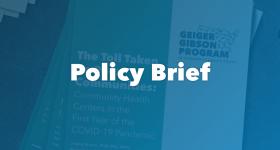A new report by the Geiger Gibson/RCHN Community Health Foundation Research Collaborative finds that repeal of key provisions of the Affordable Care Act, combined with a failure to renew critical funding streams, would result in catastrophic funding losses for community health centers– forcing these safety net providers to cut back on services, lay off staff or shut down clinical sites.



